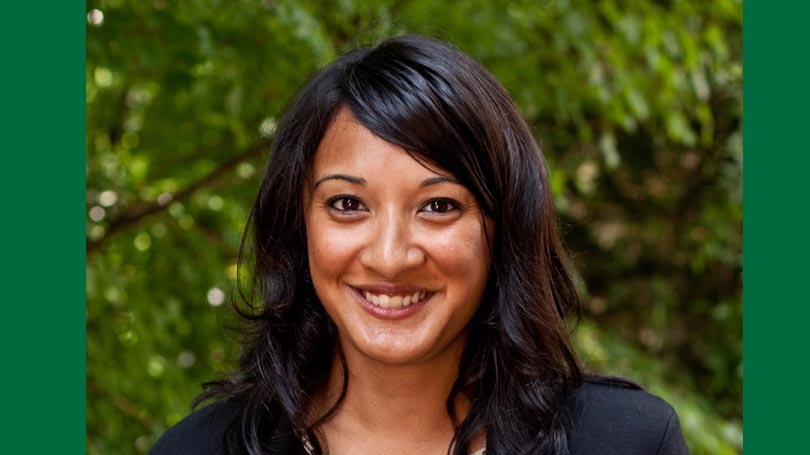
Sabrina Karim is a U.S. Foreign Policy and International Security Fellow at the John Sloan Dickey Center for International Understanding. She will take a position as an assistant professor in Government at Cornell University in the fall.
A recent book talk celebrating Equal Opportunity Peacekeeping: Women, Peace, and Security in Post-Conflict States co-authored by Sabrina Karim and Kyle Beardsley, Associate Professor of Political Science at Duke University was hosted at the Dickey Center. Daniel Benjamin, Director of the Dickey Center, opened the event by introducing Karim and Karin Landgren, who has led several peace missions with the United Nations, while also acknowledging the Dickey Center’s recent efforts to strengthen the gender and policy focus.
The main portion of the book talk was divided into two sections with Karim taking the first half to give an overview of her recently published book. The title, Equal Opportunity Peacekeeping, is highlights the book’s central theme of gender and peacekeeping. Karim introduced contextual information by acknowledging countries such as the U.S., Sweden, Canada, and other Nordic countries who do actively bring gender equality into their foreign policy. But, she noted that the UN has been at the forefront of some of these activities, particularly afrer the UN Security Council unanimously adopted United Nations Security Council Resolution 1325 in October of 2000, which institutionalized the importance of gender equality in conflict and post-conflict states. Karim and Beardsley’s main question in their book is: to what extent have peacekeeping missions achieved gender equality in and through their operations? In response to this question, Karim introduced three distinct problems: Discrimination, Gendered Protection Norms, and Protection of Sexual Exploitation, Abuse, Harassment, and Violence.
In terms of peacekeeping missions, discrimination becomes obvious when reviewing news reports of the now-famous all-female Indian formed police unit that was deployed to Liberia in 2007, who are lauded not for their work related to protection, but due to their community service. While both men and women have the same roles as peacekeepers – to protect – reports of missions tend to focus on gendered tasks such as community service projects and other examples of what can be considered a “soft approach,” while ignoring the role women play in protection. This leads to discrimination in practice because gender stereotypes are used to relegate women to certain roles in missions.
The gendered protection norm is a problem as women peacekeepers rarely get deployed to risky missions and are instead sent on the safest missions where there has been less sexual violence during wartime. Safety, security, and cultural factors are all taken into consideration for determining women’s deployment to missions. Even within the missions, women peacekeepers are restricted based upon a gendered protection norm. Women peacekeepers do not have as many freedoms as their male counterparts in terms of leaving the base or participating in activities during the mission. The third problem of sexual exploitation, abuse, harassment, and violence inhibits female peacekeepers from doing their job and also greatly diminishes the reputation and legitimacy of the mission in the eyes of locals.
Karim finished her portion of the event by calling for Equal Opportunity Peacekeeping. Recommendations to implement equal opportunity peacekeeping included being selective about mission leadership; bringing certain changes to the standards for recruiting peacekeepers, including adding standards that privilege female norms; creating safe spaces for women peacekeepers to get information through role models, networks, and mentors; as well as suggestions for training and professionalism.
Karin Landgren, who has led three UN peacekeeping and political missions in Liberia, Burundi, and Nepal, spent the second portion of the event speaking about her own experiences with peacekeeping missions. She reflected upon the issue of discrimination, as mentioned by Karim, by considering two side by side photographs of a male Special Representative of the Secretary-General and herself, a female Special Representative of the Secretary-General. She stated despite discrimination, there are no doubts about the contributions women bring to the missions when serving as peacekeepers. Women peacekeepers seem to help create a level of trust within the communities – a necessary component to any successful peacekeeping mission.
Landgren also spoke about the need for true gender parity. She stated that men tend to feel that parity has been reached when women equal 30% of a given group. However, that does not equate to actual gender parity. While men are easily heard and understood as qualified for the position, women are expected to show added value and are asked what makes them specifically qualified for the role of peacekeeper.
The event concluded with a lively discussion period between the speakers and the audience. Many questions were raised concerning solutions and recommendations for improvements going forward. The event ended with positive hope for continual progress toward equal opportunity peacekeeping.